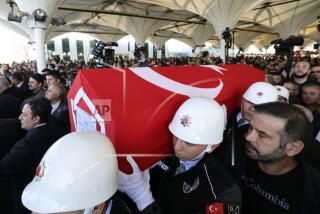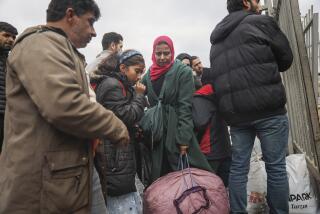REBELLION : Kurds’ Quest for Autonomy Divides Turkey : Escalating violence polarizes the country. Amid the fighting, both sides start looking for a solution.
- Share via
ISTANBUL, Turkey — The prosperous shopkeeper in Istanbul’s ancient commercial center seemed the last sort of person likely to identify with the Kurdish rebellion that has shaken Turkey to its foundations over the last two weeks.
Yet there he was, surrounded by smuggled Japanese electronic goods, angrily voicing support for the Kurdistan Workers Party (PKK) guerrillas--a group denounced as terrorists by Turkey, the United States and several of Turkey’s NATO allies.
“For years we were too scared to say we were Kurds,” Nevzat Sekerci said to nods of agreement from his neighbors, who said Kurds make up about a third of the merchants in this warren of shops beside the sea inlet still called the Golden Horn. “We don’t want a separate state. But now we want more freedom for Kurdish culture, television, papers, all those things. And if it comes to it, I suppose we’ll go back and fight for it.”
More than 100 people have been killed in mostly Kurdish-related violence in the last 10 days, triggering an angry row with Germany, Turkish air raids on rebel bases in northern Iraq and a wave of terrorist killings of police and soldiers in western Turkey.
But perhaps the most striking effect of events here has been a polarization of the political landscape of Turkey, dividing Turks from Kurds as never before.
Some 12 million Kurds live in Turkey, one in five of the population of 57 million and half of the 20 million to 25 million Kurds split in tribes among the mountains of Turkey, Iraq, Iran, Syria and the Soviet Union.
The Turkish government says more than half of the Kurds, like Sekerci, have now emigrated from the mountains to the big western cities of Turkey. There, middle-class Kurdish professionals are often assimilated and proud of a modern Turkish identity.
But because of a high Kurdish birthrate, the impoverished nature of their villages and the feudal character of their society, many young, poor Kurds are open to radical politics.
“If there is anything missing in full citizenship, let us correct that. The people who call themselves Kurds elect their mayors, their deputies,” Prime Minister Suleyman Demirel told a news conference Monday. “The opportunities of our country are open to all of us.”
But as the masthead of Turkey’s second-biggest daily newspaper Hurriyet puts it, “Turkey is for the Turks.” For 65 years, Turkey banned all expression of specifically Kurdish culture in the name of a unitary state.
As the legal restrictions against it have slowly started to lift in the past year, the Kurdish identity is beginning to manifest itself in a variety of ways.
Kurdish nationalist demonstrations that accompanied the Kurdish New Year on March 21 were the most widespread ever seen in Turkey.
About 70 Kurds were killed by gunfire. There were few, if any, casualties among the Turkish security forces.
Kurds responded by attacking dozens of Turkish embassies, consulates, banks and businesses all across Europe.
The chief organizer was the rebel PKK, a Marxist-Leninist group that now fields at least 10,000 guerrillas and bases its fight for an independent state in Lebanon’s Syrian-controlled Bekaa Valley.
The group’s terrorist label, earned in pre-1990 massacres of pro-government Kurdish families, is growing somewhat unwieldy, due to the size of the rebel army, its considerable following among the hard-bitten southeastern towns and the increasing sympathy for it in western Turkish cities.
The PKK has also toned down its demands for independence, now seeking a Turkish-Kurdish federation. It appears to be working in increasing harmony with the People’s Labor Party, a leftist political group that Turks see as a political wing of the PKK.
Under pressure from a Turkish nationalist backlash in his own conservative party, Demirel said he is ready to consider some decentralization and economic subsidies for the region, but he firmly ruled out any idea of autonomy for the Kurds.
More to Read
Sign up for Essential California
The most important California stories and recommendations in your inbox every morning.
You may occasionally receive promotional content from the Los Angeles Times.










